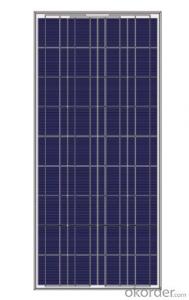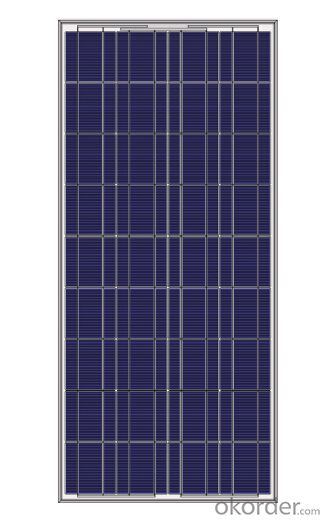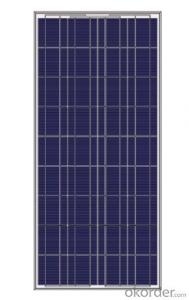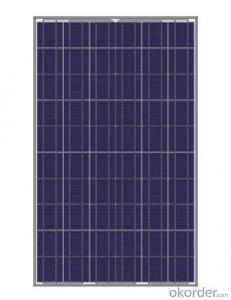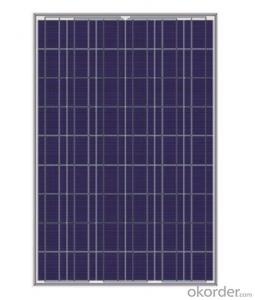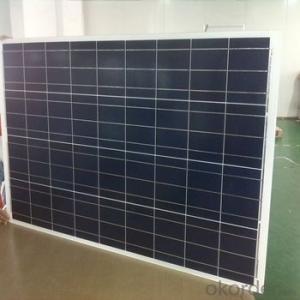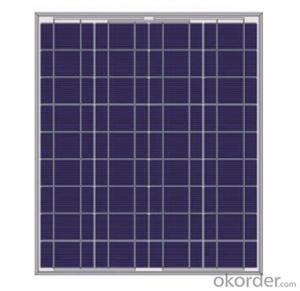Polycrystalline Silicon Solar Module Type CR140P-CR120P
- Loading Port:
- Tianjin
- Payment Terms:
- TT or LC
- Min Order Qty:
- 5 pc
- Supply Capability:
- 200 pc/month
OKorder Service Pledge
OKorder Financial Service
You Might Also Like
1. Structure of Monocrystalline silicon solar Module Type CR140P-CR120P
Solar modules, which are widely used in ground mounted utility-scale PV plants, large-scale and small civil and commercial power generating system such as BIPV combined to the grid, roof-mounted PV power system, rural electrification, communications, emergency auxiliary power. Solar PV module is comprised of some solar cells which are connected in serial with high efficiency and enhanced reliability. The solar cells are laminated between sheets of ethylene vinyl acetate (EVA) and high-clarity low-iron tempered glass, and sealed by the silica gel in a anodized aluminum frame . The solar module has got the professional certificate as following:

2. Main Features of Monocrystalline silicon solar Module Type CR140P-CR120P
esthetic appearance, with stands high wind-pressure and snow load, and easy installation
Water resistant junction box
Design to meet unique demand of customer
25 year poweroutput warranty
3. Monocrystalline silicon solar Module Type CR140P-CR120P Images
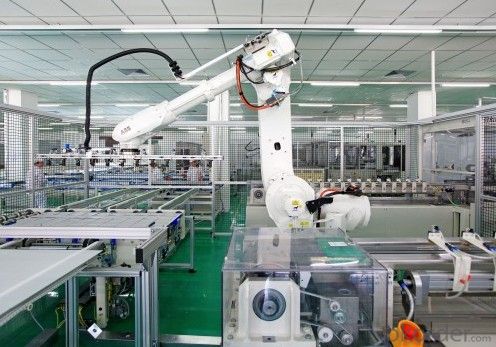
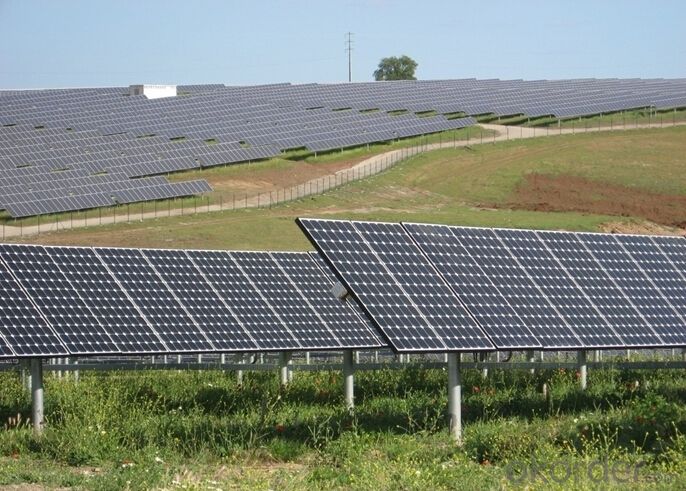
4. Monocrystalline silicon solar Module Type CR140P-CR120P Specification
Module type | CR140P | CR135P | CR130P | CR120P |
Cell type | 156mm × 156mm | |||
No. of cells and connections | 36(4×9) | |||
Dimension of module (mm) | 1478×670×35 | |||
Weight of module (kg) | 11.5 | |||
Maximum Power (Pm) | 140W | 135W | 130W | 120W |
Open-circuit voltage (Voc) | 22.0V | 21.9V | 21.8V | 21.6V |
Short-circuit current (Isc) | 8.56A | 8.44A | 8.35A | 8.25A |
Volatage at Pmax (Vmp) | 18.0V | 17.7V | 17.5V | 17.0V |
Current at Pmax (Imp) | 7.82A | 7.65A | 7.43A | 7.06A |
Maximum system voltage | 1000VDC | |||
Operating temperature | -40℃ to +85℃ | |||
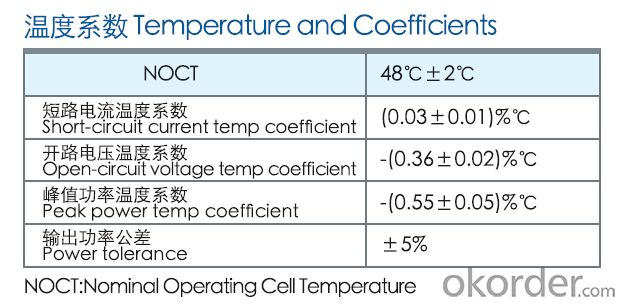
Module I-V Graph 140W
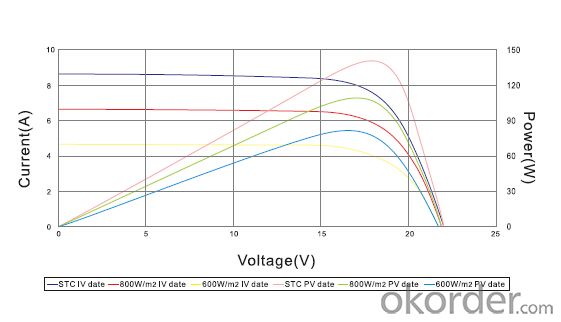
5. Monocrystalline silicon solar Module Type CR140P-CR120P FAQ
(1) Can you offer the test report of the module?
Sure. All the solar modules must pass necessary tests including EL test and ultra-red test and other visual test of the apperance, and the test report presents all the detailed data of the modules.
(2) How to confirm about the quantity and the type of solar module?
It depends on the solar system where you want to put into use the solar modules. We have experienced engineers to design for your order and you need to give more information to fix the details.
- Q: What is the efficiency of modern solar panels?
- The efficiency of modern solar panels typically ranges between 15% and 22%, with some high-end panels reaching efficiencies of up to 23-24%. However, it is important to note that efficiency can vary depending on factors such as the brand, technology used, and environmental conditions.
- Q: Can solar panels be used in deserts?
- Yes, solar panels can definitely be used in deserts. In fact, deserts are considered ideal locations for solar power generation due to their high solar irradiance and vast open spaces. The availability of ample sunlight allows solar panels to efficiently convert sunlight into electricity. Additionally, deserts often have less cloud cover and atmospheric interference, resulting in more consistent and predictable solar energy production.
- Q: Can solar panels be used in conjunction with wind turbines?
- Yes, solar panels can indeed be used in conjunction with wind turbines. This combination of renewable energy sources can provide a more reliable and consistent power supply, as wind and solar resources often complement each other. During periods of low sunlight, wind turbines can generate electricity, and during calm periods with low wind, solar panels can continue to produce power. Integrating both technologies can enhance the overall efficiency and effectiveness of a renewable energy system.
- Q: I am researching several solar panels to install in my house. I would like to use a 40 watt panel to connect, through a solar battery controller, to a battery or two. I would then like to use the solar panel (40 watts) to charge the battery(ies) for emergency use. Once charged, and when needed, I would like to use the battery(ies), 2 volt deep cycle, to power several LED lamps. Since I am new to solar power I had several questions...Is a 40 watt panel strong/large enough to charge a 2 volt deep cycle battery or two?How long would it take to charge one of these batteries?What would be the expected cost to purchase necessary supplies? (With the solar panel, battery controller, and MC4 cabling I've found I have an expected cost of roughly $00.00 with batteries)Would this be difficult for someone with little experience in this field?
- Whats the size of battery ? The time needed for your 40Watts panel to fully charge a battery depends on the size of battery. Usually battery size is mentioned in Amp-Hours (AH).
- Q: Are there any fire risks associated with solar panels?
- Yes, there are some fire risks associated with solar panels, although they are relatively rare. The main causes of fire incidents include faulty installation, poor maintenance, electrical malfunctions, and extreme weather conditions. However, the risk can be significantly minimized through proper installation, regular inspections, adherence to safety codes, and using high-quality components. Additionally, advancements in technology and industry regulations continue to enhance the safety of solar panel systems.
- Q: i want to join multiple solar panels into a bank so i only need one length of wire, i am going to use diodes to stop them sending power back into the one before it. is this ok or do i need something else?
- It sounds like you intend to put them all in parallel, since you mention blocking diodes. If the panels are all roughly the same voltage, that should work. Mismatched panels will also work, but there may be little to no contribution from the lowest voltage ones if they are severely mismatched.
- Q: Can solar panels be installed on train stations?
- Yes, solar panels can be installed on train stations. In fact, many train stations around the world are adopting solar energy systems to power their operations and reduce their carbon footprint. Solar panels are installed on the roofs or canopies of train stations to harness sunlight and generate electricity, which can be used for lighting, heating, cooling, and other station facilities. This renewable energy source makes train stations more sustainable and helps in the transition towards a greener transportation system.
- Q: So I'm trying to figure out what to ask for my birthday because its one of the few times I can get stuff for no reason, like stuff I don't normally go to the store to buy. (i dont go to the store to get much at all anyway).Anyway, I'm interested in solar panels and led and electronics and i was wondering if there is anything not over expensive that would be cool. Some things I'm interested in:solar, wind, water energyGadgets (multitools, swiss army knives)Vibram fivefingersdrawingmaking stuff (duct tape wallets, stuff out of altoids containers)basically technology and outdoors-gear stuffoh and im 6 turnin 7 male.
- solar panel is expensive, but small solar panel is not expensive, for example, 5w solar panel, solar light also not expensive led light also not expensive. i am not sure about other stuff that you said
- Q: Can solar panels be installed on golf courses or recreational facilities?
- Yes, solar panels can be installed on golf courses or recreational facilities. These places often have large open spaces and ample sunlight, making them suitable for solar panel installation. Additionally, this can help these facilities reduce their energy costs and contribute to a more sustainable and eco-friendly operation.
- Q: Can solar panels be installed on drones?
- Yes, solar panels can be installed on drones.
Send your message to us
Polycrystalline Silicon Solar Module Type CR140P-CR120P
- Loading Port:
- Tianjin
- Payment Terms:
- TT or LC
- Min Order Qty:
- 5 pc
- Supply Capability:
- 200 pc/month
OKorder Service Pledge
OKorder Financial Service
Similar products
Hot products
Hot Searches
Related keywords
